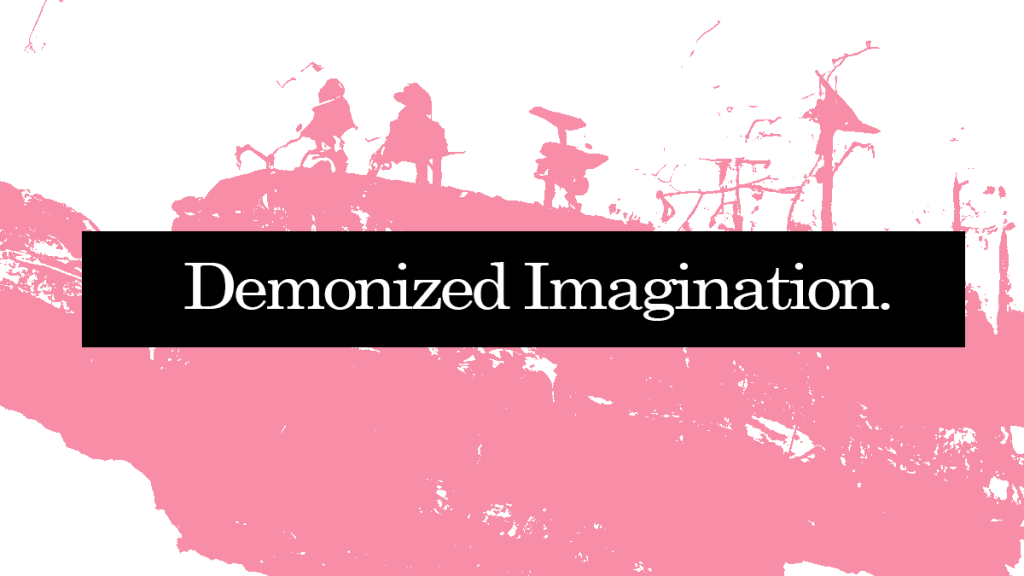This was originally published in the first issue of the Nerves zine (2021). Bethany was kind enough to allow it to be posted on the site.
My father glanced away from his driving to give me a worried look.
“Dad, It’s going to be okay.” I reassured my only ride. “Nobody has actually died because of Dungeons & Dragons.”
His eyes swept back to the road as he answered “I know, sweetheart.” in a deep voice that had been textured with a slight drawl and decades of smoking.
I had wanted to play tabletop RPGs since I first caught a glimpse of a guidebook when I was ten. And, as a young adult, this was the first time I’d gotten the chance to play one. I was lucky that my coworkers were avid players and offered a proper introduction to the hobby.
However, my father was the pastor of a small desert town named Christmas Valley between the ’80s and ’90s, and even though he wanted to support my interests, he had his reservations. Sure, now it was 2014, but the memories of his congregation members coming to him with horror stories of a new satanist plot threatening their children were still vivid in his mind. He could not help but be a little wary.
It may surprise young tabletop roleplayers today that a hobby about playing imaginary characters with friends was once literally demonized. It was the 1980’s, and fears were already building about secret societies, demented killers and the ethereal war for the immortal soul when the book Michelle Remembers became a bestseller.
The, since discredited, memoir claimed that Michelle Smith after going through hypnotic-therapy with psychologist Lawrence Pazder (who later married Michelle), recalled a traumatic childhood filled with ritual abuse at the hands of ‘The Church Of Satan.’ The claims were eventually thoroughly investigated and debunked, but lies travel fast and the imaginations of thousands of god-fearing parents had been set ablaze.
Thus began America’s Satanic Panic.
The Satanic Panic was an incidence of mass hysteria involving evangelical Christians whipped into a frenzy by baseless accusations of families conspiring in a cult network, rock music priming listeners for possession and babysitters sacrificing children at the Devil’s bequest.
Like America’s earlier witch-hunts (The Salem Witch Trials and The Red Scare), people’s lives were uprooted and, in many cases, ruined because of paranoid accusations and forced false confessions. Due to coercion by authority figures, children gave bizarre accounts in court that sent innocent people to prison for crimes that never happened. Even as recently as 2013, one couple who served 21 years were finally exonerated and released.
Alongside the babysitter witch hunt, a new game was erroneously blamed for several tragedies. In each case, someone involved enjoyed playing Dungeons and Dragons.
One of the most famous cases was that of James Dallas Egbert III, a prodigy college student. He had gone missing in 1979 after a failed suicide attempt, and a private investigator was sent to his college to investigate. After finding D&D guide books in James’ dorm room, and stories of students role-playing in the utility tunnels underneath the school, the P.I. speculated to the press that James had gotten lost in the tunnels after having a mental breakdown during a D&D session.
Based on the P.I.’s gut instinct, the press ate it up and reported it as fact as “The Steam Tunnel Incident.” The story gained national attention and the search was on.
James was hiding out at a friend’s house, moved to two other houses, then took a bus to New Orleans, and finally to a small town further into Louisiana, where he contacted the P.I. and revealed his location. When the two met, James asked the investigator to hide the truth behind his disappearance (his struggles with drug abuse, overbearing parents and his sexuality) and was left in the custody of his uncle.
Unfortunately, a year later, he succumbed to his depression and committed suicide. The idea that D&D caused his disappearance persisted for several years after his death. It was easier to blame a game found in James’ dorm room than to understand that he was a gifted young man who felt immense pressure to be what others wanted him to be.
Years later a book, titled Mazes and Monsters, was written. Inspired by the original press reports it featured a student who loses touch with reality and has a psychotic episode while role-playing in the utility tunnels at his school. Later, the book was adapted into a movie starring Tom Hanks, further stoking paranoid parents’ growing concerns.
Four years after James’ death, the P.I. published a book, The Dungeon Master. Within, he revealed the truth about what James had told him
In another incident, a concerned parent named Patricia Pulling formed B.A.D.D. (Bothered About Dungeons & Dragons) after her son, Irving, committed suicide. B.A.D.D.’s goal was to eliminate D&D and games like it. Patricia claimed her son shot himself in the chest because his school Principal and Dungeon Master had put a D&D curse on his character. She first tried to sue the Principal and, later, D&D’s publishers but both cases were thrown out.
Patricia spread her views through Christian outlets and mainstream media, including an appearance on “60 Minutes.” She accused D&D of promoting satanism and suicide, among many other things.
Most concerning, Pulling began consulting for police, acting as a “D&D expert” in several game related lawsuits. Luckily all the lawsuits lost in court but—considering she made wild, unsupported claims like that 8% of the population of Richmond, Virginia, are involved in Satanic worship—she should never have been considered an expert witness.
The fear-mongering did not stop with suicides; it also included murder. Christopher Pritchard, the stepson of Lieth Von Stein, allegedly masterminded the plot to murder his stepfather in order to inherit his wealth. To this end he recruited another young man named James Upchurch who ultimately bludgeoned Lieth to death. Upchurch played D&D as a Dungeon Master, and apparently had made a game map of Lieth’s home, which was later brought up as physical evidence in his trial. The media latched onto that small detail; subsequently, books, films, and television series were created that implied D&D inspired the murder.
Ironically enough, the controversies created a Streisand Effect—sales for D&D manuals skyrocketed.
Back to the point, this mass hysteria stigmatized anyone considered an outcast or who didn’t fit in with their traditional-minded communities. In 1993 three goth teens were convicted of the heinous sexual assault and murder of three boys, labelled by newspapers as The West Memphis Three. There was zero physical evidence linking them to the crime but, because it was rumored they worshiped Satan, they were accused, investigated, and convicted.
It was not until 2011 when new D.N.A. evidence proving they were innocent was found, and they were released. Imagine serving years in prison because you like to wear dark clothing.
Friends of mine who enjoy Tabletop RPGs have described how they hid their hobby from their religious parents for fear of upsetting them. I was an independent adult by the time my mother found out about my hobby, and it became a big point of contention. She expressed her concerns over possession and witchcraft and claimed that I was choosing dice over my family. I even brought up the Satanic Panic in one of our arguments, and she said, “Don’t call it that. They call it that to discredit us.”
Nowadays, the idea that a game could drive a bunch of nerds to insanity, murder and suicide is absurd. Nevertheless, to some baby boomer Christian parents, it was all too real.
For this article, I interviewed my father about his experience during the Satanic panic: Me: How did you get introduced to the idea that D&D was demonic?
Him: As a pastor in the Oregon High Desert, a number of parents came to me with concerns that their kids were getting involved with something they didn’t understand. This was a farming and ranching community. The kids all grew up in cowboy boots, they knew how to work, and all of a sudden, they wanted to do something else on their weekends.
Me: So they came to you?
Him: Well, they came to me and knew that there was this one particular guy. He was into D&D, I drove up to his house one day. It was a learning experience; he showed me figurines; he showed me dice. It was kinda like Risk or Monopoly. I’d rather play Risk, this (D&D) didn’t look like my cup of tea, and so I could understand why parents were upset. Board games could take an entire day, but D&D was something that was captivating these kid’s minds more than the 24 hour period.
Me: Campaigns can last for years.
Him: Yeah, so it really was concerning. It distracts people from everyday existence.
Me: How important was this issue to your congregation?
Him: Oh, it was right up there. D&D was taking their minds off of what their parents really wanted them to do.
Me: What actions as pastor did you take as response? Like when you visited the Dungeon Master’s house.
Him: I didn’t mind him at all. He and I got along fabulously, but I did warn the kids about taking on something that distracts them. I’ll admit his house was a little unkempt and his hair greasy. And, you know me, I’m not fond of that, but he was normal and a nice guy. The parents thought it was demonic; oh yeah, they were fit to be tied.
Me: How did you feel when I expressed interest in D&D?
Him: Well, I was pretty much fit to be tied… Fit to be tied is an old phrase for, uh, how would you put it? Completely dismayed.
[He and I laugh]
Him: It wasn’t because I thought the dice were evil now, they are kinda funny lookin’, I’ll admit, but they’re not evil. When I was a pastor, some of the people were Mennonites. Now they’ll play Uno till the sun comes down, but if you were to take into their house a regular set of playing cards. They would be horrified! Absolutely horrified because that’s the way they were raised.
Kinda like if someone was at my house and whipped out a pack of tarot cards, I’d probably just tell them to leave. That was how I was raised; my dad was pretty firm on that. The farmers and ranchers thought it was demonic, for sure. When you said you were interested in that, I was like, ‘ah crap. I was hoping she’d never find something like D&D.‘
Me: What do you think people can do today to prevent incidents of mass hysteria like the Satanic Panic?
Him: Well, you know they’re operating completely on fear. D&D plays on the fears of my generation, you know? We had nursery rhymes that were pretty bizarre, Shakespeare, which was pretty bizarre, but nothing like… It was like D&D took it over the edge. D&D, when it came out, the content of it was kinda scary to my generation. Lucky for you, I was one of the last baby boomers. So I was just a hair more progressive than them.
I have to laugh a little cause I’m sure someday you’ll be my age and worried about some new thing your kids are doing. And, they’ll think it’s silly to worry. And, who knows? Maybe it is.
I’m lucky that my father has always emphasized freedom of choice with me. My parents divorced when I was little and it was like being raised twice. My mother’s way of rearing focused on control, while my father’s was the opposite, believing that even “mistakes” were essential to learning and growing as a person.
Before becoming a pastor, he was a wild child who regularly disappeared (in one instance to hitchhike across the United States) and made his parents worry endlessly. He’s always been thankful that his kids hadn’t given him a taste of his own medicine. So even though I knew it worried him, I could talk to him about it and even ask for a ride to my first D&D session.
I remember hiding the fact I was playing Pokémon on my Nintendo Gameboy as a little kid because a famous pastor said that Pokémon were demons. When my father found out, it took some convincing but he eventually realized that it was harmless.
Later, it was Harry Potter. My family had a Christian documentary about how media portrayals of witchcraft could teach children how to serve the Devil in return for powers. I watched it several times, not because I was forced to, but because my child brain thought it was spooky. When there were no Goosebumps movies to rent at Blockbuster, I turned to that documentary with moms scared out of their wits about sorcery.
Much like Pokémon, my dad was open-minded enough to take a good faith look at it eventually. We both became Harry Potter fans after that, and he even had a little in-joke saying, “Cookie-crumble, you’re no muggle.”
When I hear that some people are still hiding their hobbies from their parents out of fear of rejection, It saddens me. Tabletop RPGs are everything that older generations claim that young people do not do anymore: make friends, be sociable, be imaginative and, even, do math. They played cops and robbers as kids, but nobody said doing that would turn them into felons.
However, do you know what D&D might turn you into? Based on much scientific research, it can make you a better person. Studies show improvements in social skills, problem-solving capabilities, collaboration with others, empathy and there is evidence it combats depression.
Youth groups and educators are now using role-playing games to help grow children’s emotional intelligence. Therapists include RPGs in their treatments, and psychologists are praising role-playing’s benefits in cognitive therapy.
To think, four decades ago, pastors and parents alike posited that games like D&D were harming kids when it was, in actuality, a beneficial outlet for them. It could be argued that for kids like James Dallas Egbert III or Irving Pulling, D&D was an attempt to soothe the emotional turmoil they were suffering from. Far from causing their problems, the game may have been one of their only healthy coping mechanisms.
Growing up as a pastor’s kid, I saw first hand the reactions of Evangelicals to media they did not understand. At times, I felt the need to hide, but now I am lucky enough to have no reason to. Sadly, not every parent is willing to be convinced even today.
The scientific evidence shows that games like D&D can be educational and therapeutic. The last thing that anyone needs is for imagination to be demonized.
Scientific study references:
Adams, Aubrie S. (2013) “Needs Met Through Role-Playing Games: A Fantasy Theme Analysis of Dungeons & Dragons,” Kaleidoscope: A Graduate Journal of Qualitative Communication Research: Vol. 12, Article 6. Available at: http://opensiuc.lib.siu.edu/kaleidoscope/vol12/iss1/6
McGonigal, J. (2011). Reality is broken: Why games make us better and how they can change the world. Penguin Press.
Bratton, Sue & Ray, Dee & Rhine, Tammy & Jones, Leslie. (2005). The Efficacy of Play Therapy With Children: A Meta-Analytic Review of Treatment Outcomes.. Professional Psychology: Research and Practice. 36. 376-390. 10.1037/0735-7028.36.4.376.
Allaire, Jason & McLaughlin, Anne & Trujillo, Amanda & Whitlock, Laura & Laporte, Landon & Gandy, Maribeth. (2013). Successful aging through digital games: Socioemotional differences between older adult gamers and Non-gamers. Computers in Human Behavior. 29. 10.1016/j.chb.2013.01.014.
Bratton, Sue & Ray, Dee. (2000). What the research shows about play therapy. International Journal of Play Therapy. 9. 47-88. 10.1037/h0089440.
Hughes, J. (1988). Therapy is fantasy: Roleplaying, healing and the construction of symbolic order. Paper presented in Anthropology IV Honours, Medical Anthropology Seminar, Dr. Margo Lyon, Dept. of Prehistory & Anthropology, Australian National University. Retrieved from http://www. rpgstudies.net/hughes/therapy_is_fantasy.html
Blackmon, W. D. (1994). Dungeons and Dragons: The use of a fantasy game in the psychotherapeutic treatment of a young adult. American Journal of Psychotherapy, 48(4), 624-632.
Simon, Armando. (1987). Emotional stability pertaining to the game of Dungeons & Dragons. Psychology in the Schools. 24. 329 – 332. 10.1002/1520-6807(198710)24:4<329::AID PITS2310240406>3.0.CO;2-9.


